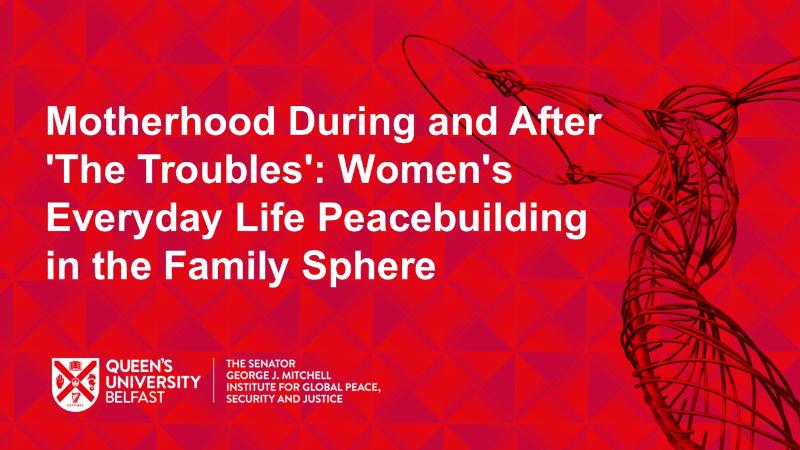Motherhood During and After 'The Troubles': Women's Everyday Life Peacebuilding in the Family Sphere
- Date(s)
- October 21, 2025
- Location
- Senate Room, Lanyon Building, QUB
- Time
- 16:00 - 17:30
- Price
- Free
Speaker: Dr Yumi Omori (Stellenbosch University)
Chair: Dr Allely Albert (Queen’s University Belfast)
Despite the growing attention to gender in peace and conflict studies, the field has not seriously examined women’s everyday lives in the family sphere in war-torn societies through a sociological lens. This study foregrounds motherhood in times of conflict and peace processes through the voices of 55 women who raised their children during and after ‘the Troubles’. The study examines the role of the family in the processes of social transformation in conflict-affected societies, highlighting that mothers play essential yet often overlooked roles in maintaining and restoring sociability in such societies. The study illustrates that mothers have been hidden and underappreciated ‘everyday peacebuilders’, as well as hidden and trivialised victims of the conflict.
Dr Yumi Omori is a Postdoctoral Research Fellow at the Centre for the Study of the Afterlife of Violence and the Reparative Quest, Stellenbosch University, South Africa. Originally from Japan, her research focuses on gender and everyday life in ethnically divided societies. Her first book, Everyday Life Peacebuilding and Family: Motherhood During and After ‘The Troubles’ in Northern Ireland, was published by Palgrave in December 2024. Her current research examines the experiences of motherhood in post-apartheid South Africa, comparing the reflections of women in different ethnic groups. She holds a PhD in Sociology from the School of Social Sciences, Education and Social Work and an MA in Conflict Transformation and Social Justice (Distinction) from the Senator George J. Mitchell Institute for Global Peace, Security and Justice, Queen’s University Belfast.
Dr Allely Albert is a Fellow of the Mitchell Institute and Lecturer in Criminology at Queen's University Belfast. Her research focuses on informal security practices and ex-prisoner agency, highlighting community-based approaches to safety and the role of lived experience in peacebuilding contexts. In particular, her work has emphasised ex-prisoner leadership in restorative justice efforts in Northern Ireland and the United States, exploring the wider dynamics that such inclusive models engender. Originally from California, she has been involved in justice and peacebuilding mechanisms in a wide variety of settings and systems, and holds multiple certifications related to restorative justice, including certifications in mediation, victim-offender dialogue, and restorative practice.
